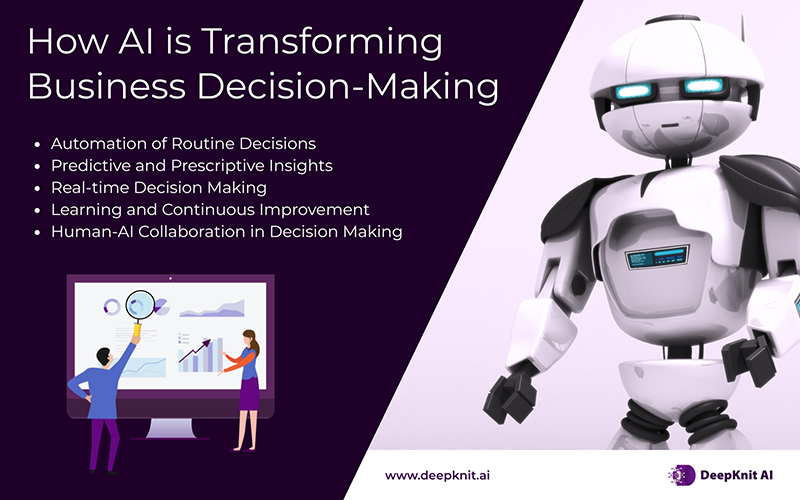“By 2026, more than 80% of enterprises will have used generative AI APIs and models, and/or deployed generative AI-enabled applications in production environments.”
– Gartner Press Release, 2023
In an increasingly dynamic business environment where data is abundant but meaningful action is limited, a business’s decision-making capabilities will ultimately decide its future. From supply chain logistics and customer care management to financial forecasting and human resources, decision-based workflows are crucial for modern organizations’ success.
Artificial Intelligence (AI) has been a sweeping force that is revolutionizing how decisions are made, structured, and integrated across industries.
But what exactly is the role of AI in decision-based workflows? How can organizations tap its full potential to structure operations, improve productivity, and scale intelligently? This post will explore the role of AI in decision-based workflows and how partnering with an automation partner like DeepKnit AI can make all the difference.
Understanding Decision-based Workflows
At its very core, a decision-based workflow is an organized sequence of tasks and choices that must be made to achieve a specific business goal. These workflows are common in areas like approval processes, fraud detection systems, loan underwriting, risk assessment, and even dynamic pricing models. Conventionally, they are heavily reliant on static rules, human expertise, and manual intervention; methods which are prone to inconsistency, latency, and error.
AI provides a radical shift.
With technologies like machine learning (ML), natural language processing (NLP), computer vision, and predictive analytics, AI imbues smart intelligence into automation-streamlining business processes, making workflows adaptive, data-driven, intuitive and regularly learning from outcomes.
How AI Improves Decision-making in Business
- Automation of Routine Decisions
One of AI’s most prominent contributions has to be the automation of routine, rule-based decisions. AI systems can assess structured and unstructured data to identify patterns, and apply predefined rules at scale. For instance, in finance, AI can automatically validate low-risk transactions or flag any discrepancies for human review.
AI workflow automation minimizes the operational load on admin teams thereby enabling them to focus on high-value tasks.
- Predictive and Prescriptive Insights
AI doesn’t just automate decisions; it enhances them. Predictive analytics utilizes historical data to predict outcomes, while prescriptive analytics recommends the ideal course of action based on those predictions.
For example, in customer service, AI models can predict which clients are likely to churn and suggest tailored retention strategies. In logistics, these models can recommend route optimizations before any issue arises.
- Real-time Decision Making
AI enables decisions to be made in real time, based on data from multiple sources like sensor data, CRM systems, ERP platforms, and more. This is particularly valuable in high-stakes environments like healthcare diagnostics, financial/bank trading and cybersecurity.
When there’s the capability of processing large datasets instantly, it can ensure the decisions are timely, context-aware, and relevant.
- Learning and Continuous Improvement
Machine learning models learn and improve over time. As they process more data and observe outcomes, their algorithms get better, leading to better decision quality. This self-improving loop is vital in industries like healthcare, e-commerce, marketing, and fintech where the stakes are high.
DeepKnit AI, for example, exemplifies this capability by integrating intelligent feedback loopsinto client workflows, enabling systems that don’t just execute decisions—they evolve with them.
- Human-AI Collaboration in Decision Making
Contrary to the common misconception of humans being replaced, AI often augments human decision-making. In complex, high-risk decisions, such as medical diagnoses or legal interpretations, AI workflow automation serves as an advisor, presenting options supported by accurate data. This collaborative model increases accuracy and saves time, while retaining ethical and contextual judgment that humans bring.
AI-driven platforms like those developed by DeepKnit AI empower teams with decision-support tools that are transparent, explainable, and highly customizable.
Use Cases Across Industries
- Healthcare: AI for healthcare systems assist in diagnosis, treatment recommendations, and patient triage, thereby reducing response times and enhancing patient outcomes.
- Finance: AI enhances fraud detection, credit scoring, algorithmic trading, and regulatory compliance through real-time monitoring and decision support.
- Retail: Smart AI for businesses can handle dynamic pricing, inventory management, and personalized marketing campaigns based on customer behavior patterns.
- Manufacturing: Predictive maintenance, quality control, and supply chain optimization are supercharged by AI, minimizing downtime and increasing efficiency.
- HR and Recruitment: Intelligent systems can screen resumes, assess candidate fit, and recommend onboarding pathways, dramatically shortening hiring cycles.
The Challenges of Implementing AI in Workflows
Despite its many advantages, integrating AI into decision workflows isn’t straightforward and hence meets a unique set of challenges. The most common concerns hover around data privacy, algorithmic bias, and explainability. Moreover, aligning AI initiatives with strategic business goals requires interdisciplinary collaboration between data scientists, IT professionals, and business leaders.
And, that’s why it’s essential to partner with solution providers who offer not just tools, but deep domain expertise and a proven methodology. Companies like DeepKnit AI specialize in integrating AI into existing workflows, ensuring responsible innovation and measurable outcomes.
Final Thoughts
With the volume and complexity of business decisions growing beyond scale everyday, AI stands as a trustworthy, indispensable ally. It can automate the mundane, enhance the complex, and speed-up the business strategy. When it comes to decision-based workflows, AI doesn’t just make decisions faster; it makes them smarter.
Organizations that adopt this impending shift at the very earliest, will be tomorrow’s leaders. And with a partner such as DeepKnit AI backing your transition into intelligent workflow automation, you can ensure your journey towards success to be fruitful and sustainable.
If you’re ready to experience the full potential of AI in your decision-making processes, now is the time to act. The future won’t wait. Will you?
Smarter Workflows Start Here
Build intelligent workflows that evolve and scale with your needs!


